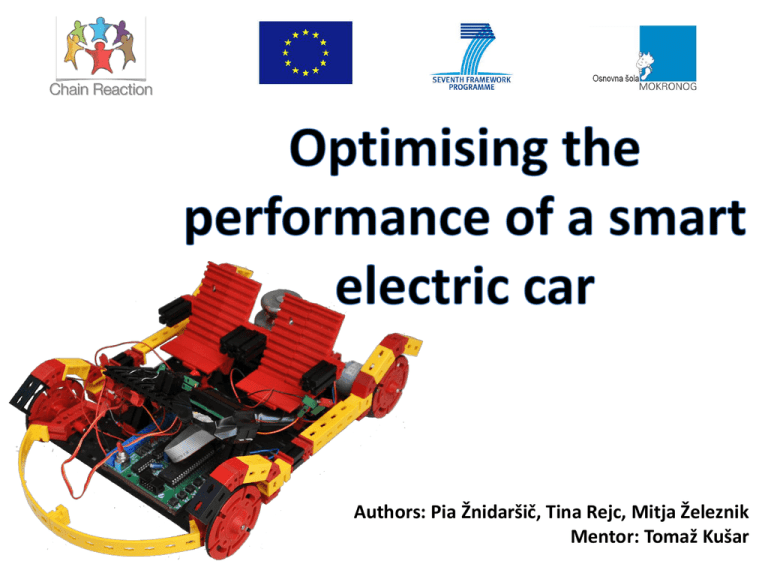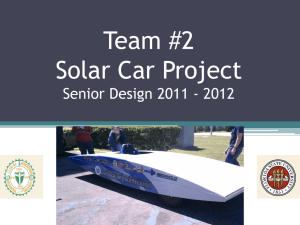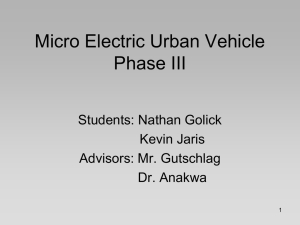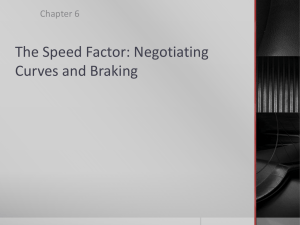ZELENO OGREVANJE
advertisement

Authors: Pia Žnidaršič, Tina Rejc, Mitja Železnik Mentor: Tomaž Kušar Charging solar panels wireless charging regenerative braking Hypothesis A good part of the car’s kinetic energy can be converted into electricity with the use of regenerative braking system. In such a way, we can improve the car’s efficiency. The electric car still needs ordinary brakes alongside the regenerative braking system due to its slow braking ability. The construction of the electric car Research video clip: our experiment We tried to find out an answer to the question: how to improve the electric car‘s efficiency? 𝜂[%] = 𝐴𝑒 𝑊𝑝 1. We compared a basic diode and light emitting diode. 2. We also used different capacities of a capacitor. Measurements At first we measured the braking distance while the DC motors weren‘t connected to an electric circuit. Total potential energy is converted to the force of friction (braking force). 𝑊𝑝 = 𝐴𝑓𝑟𝑖𝑐𝑡𝑖𝑜𝑛𝑎𝑙 𝑓𝑜𝑟𝑐𝑒 1 𝑊𝑝 = 𝑚 ∙ 𝑔 ∙ ℎ 𝑥1 … … … 𝑏𝑟𝑎𝑘𝑖𝑛𝑔 𝑑𝑖𝑠𝑡𝑎𝑛𝑐𝑒 braking distance Then we measured the amount of electricity converted from kinetic energy by the DC motors (generators). 𝑥2 … … … 𝑏𝑟𝑎𝑘𝑖𝑛𝑔 𝑑𝑖𝑠𝑡𝑎𝑛𝑐𝑒, while regenerative braking system was used 𝐴𝑓𝑟𝑖𝑐𝑡𝑖𝑜𝑛𝑎𝑙 𝑓𝑜𝑟𝑐𝑒 2 = 𝑥2 ∙ 𝑊𝑝 𝑥1 𝐴𝑒 = 𝐴𝑓𝑟.𝑓𝑜𝑟𝑐𝑒 1 - 𝐴𝑓𝑟.𝑓𝑜𝑟𝑐𝑒 2 𝑊𝑝 = 𝐴𝑓𝑟𝑖𝑐𝑡𝑖𝑜𝑛𝑎𝑙 𝑓𝑜𝑟𝑐𝑒 2 + 𝐴𝑒𝑙 𝜂[%] = 𝐴𝑒 𝑊𝑝 Results 𝐴𝑒𝑙 = 𝑊𝑝 − 𝐴𝑓𝑟.𝑓𝑜𝑟𝑐𝑒 𝐴𝑒𝑙 = 5,4𝐽 − 3,37𝐽 = 𝟐, 𝟎𝟑𝐉 𝐴𝑒𝑙 = 5,4𝐽 − 3,5𝐽 = 𝟏, 𝟗𝐉 These results were obtained on the basis of length measurement and calculated potential energy. Then we measured the amount of electricity we actually got in each case. Results The voltage on the capacitor in dependence on a diode type 10 9 8 7 Umax [V] 6 5 basic diode LED 4 3 2 1 0 1 2 3 No. of measurements 4 5 Results The capacitor's electricity in dependence on a diode type 0.45 0.40 0.35 W kon. [J] 0.30 0.25 basic diode 0.20 LED 0.15 0.10 0.05 0.00 1 2 3 No. of measurements 1 𝑊𝑒𝑙 = ∙ 𝐶 ∙ 𝑈 2 2 4 5 Results The voltage on capacitor in dependence on the capacitor‘s capacity 10.00 9.00 8.00 7.00 Umax [V] 6.00 5.00 LED 4.00 basic diode 3.00 2.00 1.00 0.00 0.01 0.02 0.03 C [F] 0.04 Results The amount of electricity in dependence on the capacitor's capacity 1.60 1.40 W kondenzatorja [J] 1.20 1.00 0.80 basic diode LED 0.60 0.40 0.20 0.00 0.01 0.02 0.03 C [F] 0.04 Results • The results of the circuit by a simple diode are better, because the basic diode consumes less power. • By increasing the capacitor‘s capacity we can store more electricity. The amount of stored electricity also depends on the braking distance. Literature [1] Tesla motors, available at http://www.teslamotors.com/ [2] List of electric cars currently available, available at http://en.wikipedia.org/wiki/List_of_electric_cars_currently_available [3] How Does Regenerative Braking Work? Available at http://www.carsdirect.com/green-cars/how-does-regenerative-braking-work [4] Regenerative brakes, available at http://en.wikipedia.org/wiki/List_of_electric_cars_currently_available [5] The Kinetic Energy Storage, available at http://www.youtube.com/watch?v=ZHgN1Qv9LU [6] Regenerative braking, available at http://www.cyberphysics.co.uk/topics/energy/regenerative_braking.htm [7] What is the regenerative braking system?, available at http://www.alke.com/brakeenergy-recovery.html Thank you for your attention.







![Sample_hold[1]](http://s2.studylib.net/store/data/005360237_1-66a09447be9ffd6ace4f3f67c2fef5c7-300x300.png)



